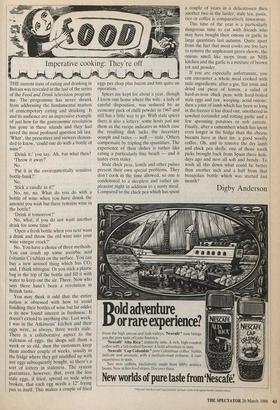Imperative cooking: They're off
THE current state of eating and drinking in Britain was revealed in the last of the series of the Food and Drink television program- me. The programme has never shrunk from addressing the fundamental matters of contemporary eating and drinking. It and its audience are an impressive example of just how far the gastronomic revolution has gone in these islands and they had saved the most profound question till last. `What', the presenters and viewers deman- ded to know, 'could one do with a bottle of wine?'
`Drink it,' you say. Ah, but what then? 'Throw it away?'
No.
'Put it in the environmentally sensitive bottle-bank?'
No.
'Stick a candle in it?'
No, no, no. What do you do with a bottle of wine when you have drunk the amount you wish but there remains wine in the bottle?
'Drink it tomorrow?'
No, what, if you do not want another drink for some time?
'Open a fresh bottle when you next want a drink and throw the old wine into your wine vinegar crock?'
No. You have a choice of three methods. You can crush up some ascorbic acid (vitamin C) tablets on the surface. You can buy a new aerosol thing which has CO2 and, I think nitrogen. Or you stick a plastic bag in the top of the bottle and fill it with water to keep out the air. There. Now who says there hasn't been a revolution in British taste.
You may think it odd that the entire nation is obsessed with how to avoid finishing their bottles of wine but far odder is its new found interest in freshness. It doesn't extend to anything else. Last week, I was in the Atkinsons' kitchen and their eggs were, as always, three weeks stale. There is a collaborative aspect to the staleness of eggs: the shops sell them a week or so old, then the customers keep them another couple of weeks, usually in the fridge where they get muddled up with any eggs subsequently bought, so there's a sort of lottery in staleness. The system guarantees, however, that, even the less stale eggs, if fried, spread so wide when broken, that each egg needs a 12" frying pan to itself. This makes a couple of fried eggs per chap plus bacon and bits quite an operation.
Spices are kept for about a year, though I know one home where the wife, a lady of careful disposition, was seduced by an economy pack of chilli powder in 1967 and still has a little way to go. With stale spices there is also a lottery: some hosts just use them as the recipe indicates in which case the resulting dish lacks the necessary oomph and tastes — well — stale. Others compensate by tripling the quantities. The experience of their dishes is rather like eating a particularly fine beach — and it tastes even staler.
Stale chick peas, lentils and other pulses present their own special problems. They don't cook in the time allowed, so one is condemned to a sleepless and rather un- pleasant night in addition to a nasty meal. Compared to the chick pea which has spent a couple of years in a delicatessen then another two in the larder, stale tea, pasta, rice or coffee is comparatively innocuous.
This time of the year is a particularly dangerous time to eat with friends who may have bought their onions or garlic in large quantities last autumn. Quite apart from the fact that most cooks are too lazy to remove the unpleasant green shoots, the onions smell like mops from an NHS kitchen and the garlic is a mixture of brown rot and powder.
If you are especially unfortunate, you can encounter a whole meal cooked with stale ingredients: after a gin, flat tonic and dried out piece of lemon, a salad of hard-as-iron chick peas with hard-boiled stale eggs and raw, weeping, acrid onions; then a joint of lamb which has been so long in the freezer it has dried out, smothered in sawdust coriander and rotting garlic and a few sprouting potatoes or soft carrots. Finally, after a camembert which has spent even longer in the fridge than the cheese biscuits have in their tin, a good woolly coffee. Oh, and to remove the dry lamb and chick pea shells, one of those tooth picks brought back from Spain three holi- days ago and now all soft and bendy. To wash all this down what could be better than another inch and a half from that beaujolais bottle which was started last month?
Digby Anderson


















































 Previous page
Previous page